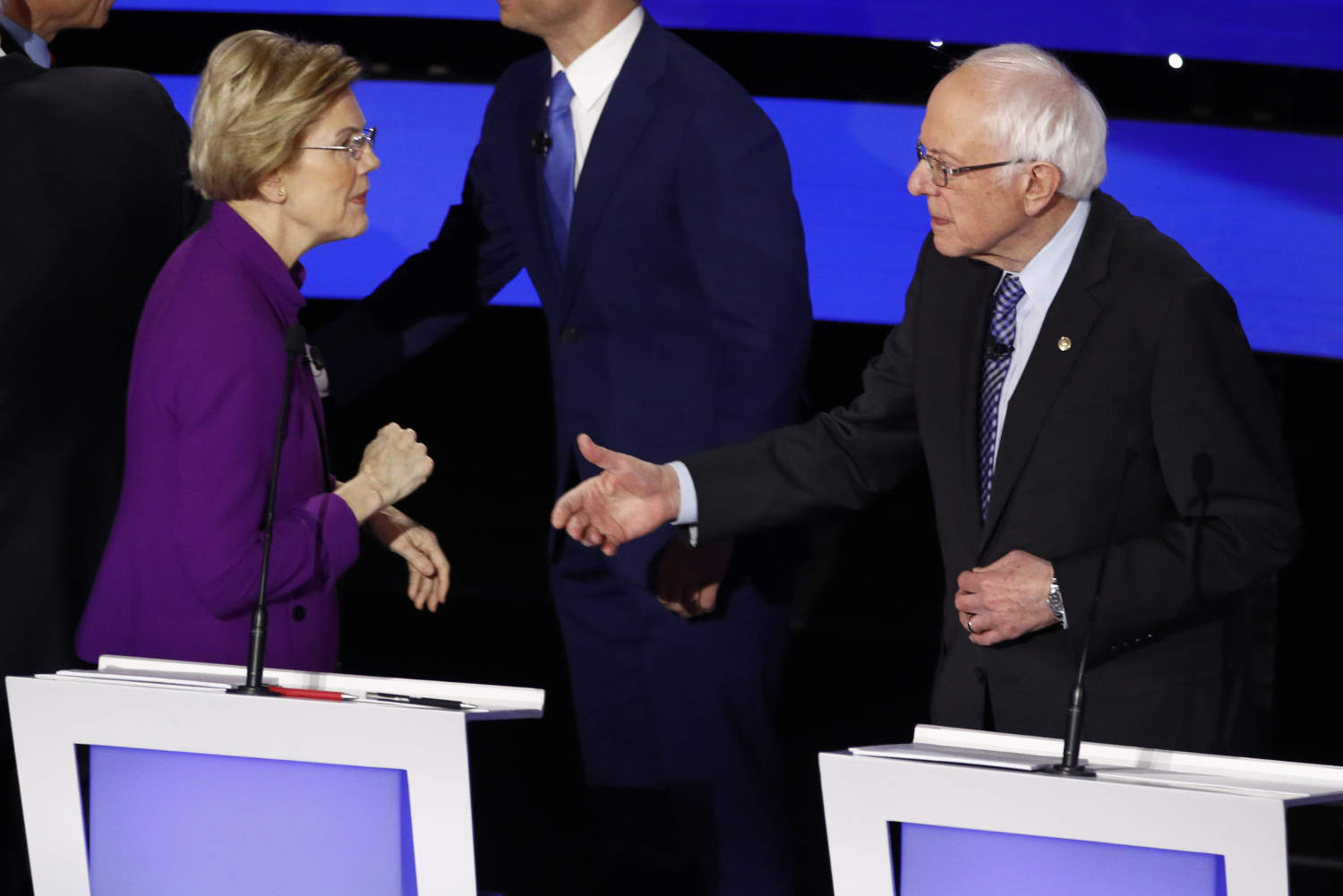Democratic Presidential Candidates Should Talk About Cryptocurrency
- Aside from a few generic mentions, cryptocurrency has been left out of the 7 Democratic debates so far.
- The digital assets sector has matured enough to demand the attention of top-level lawmakers as regulatory uncertainty keeps hindering innovation.
From left: Tom Steyer, Elizabeth Warren, Joe Biden, Bernie Sanders, Pete Buttigieg, Amy Klobuchar, discussing politics at the 7th Democratic debate, hosted by CNN and the Des Moines Register. Scott Olson/Getty Images
With a little over 4 months left until delegates of the Democratic Party choose their nominee for president of the United States for the 2020 election, we have yet to see anyone from the leading candidates talk about cryptocurrencies.
There have been 7 debates thus far, but the only taste of crypto talk we have gotten is just a few generic mentions, with Andrew Yang standing out by being the only candidate that accepts donations in cryptocurrency.
President Trump, on the other hand, has made his standpoint on bitcoin and other crypto assets crystal clear:
Instead of bashing on each other for things they did or did not in the past, it might be better to focus on appealing to the huge community that the crypto sector has become. The United States, alongside China, is one of the most established places for blockchain-based startups and cryptocurrency traders.
With regulatory uncertainty constantly strangling the crypto market, it would be great if some of the leading politicians in the Democratic party updated their standpoints on digital assets.
Joe Biden, Bernie Sanders, Elizabeth Warren, Pete Buttigieg, and Amy Klobuchar have now covered their core campaign goals countless times. We get it. Different variations of universal healthcare, climate change plan of action, gun control, and military activity in the Middle East now identify each candidate and their chances for the 2020 presidential race.
But the highlights from the last couple of debates include petty fights over who said what or who did what some many years ago. In the last debate, Elizabeth Warren refusing to shake Bernie Sanders’ hand became infamous:

Then there was Elizabeth Warren’s attack on Pete Buttigieg in the 6th debate for him allegedly holding a fundraiser in a “wine cave”.
“The mayor just recently had a fundraiser that was held in a wine cave full of crystals and served $900-a-bottle wine,” Warren said. “Think about who comes to that.”
All this nonsense, as entertaining as it might be, is not giving answers to questions posed by our current socio-economic situation.
Cryptocurrencies have been around since 2009 and are obviously here to stay. It is essential for businesses and investors to know what the current standpoint of left politicians is on this emerging market.
The situation with crypto assets is no longer a small parade like it was back in 2013. The sector has matured a lot since then and blockchain technology is no longer seen as the enemy of the status quo. Industries as varied as healthcare and banking are already being disrupted by digital ledger technologies.
Tokenization of assets has become a viable investment business model, providing a level of flexibility unseen before in the business sector. The crypto sector is no longer just a bunch of “libertarian wackos” that think Bitcoin will and should replace the Federal Reserve.
It is now an evolved market that can no longer be ignored. As such, top-level lawmakers should finally come up with a clear regulatory framework to define the ecosystem, as the European Union did in part.
I personally believe that they should just leave it alone insofar as money laundering using digital assets is made impossible, but the regulatory uncertainty and its stranglehold on the crypto sector is hindering innovation on a much broader scale. This has to change.
- New York Times sources have noted that federal prosecutors are digging deeper into the political donations made by Sam Bankman-Fried and his colleagues.
- While the former FTX CEO had donated around $40 million to Democrats in the last election cycle, Democratic groups have so far vowed to return only around $2 million.
- Three major Democratic committees have reportedly vowed to return a little more than $1 million in political donations received from Sam Bankman-Fried.
- A super PAC supporting Senate Democrats, that received $1 million in donations from SBF, is also waiting on “proper direction from federal law enforcement” on how to return the funds.
- We now have the technology to immutably store and process data in a trustless environment, yet we still resort to paper ballots as the fundamental ingredient for elections.
- In a blockchain-enabled future, voting will be as simple as withdrawing money from an ATM, and processing election results will be finished in minutes.

